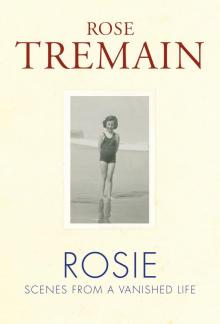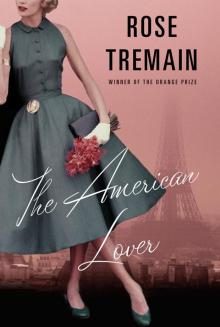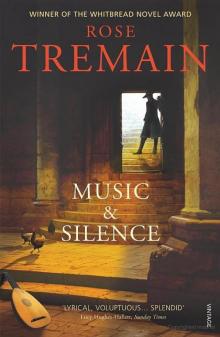- Home
- Rose Tremain
Letter to Sister Benedicta Page 3
Letter to Sister Benedicta Read online
Page 3
By the end of Leon’s day in bed with the photograph albums he had cheered up. He smiled at me when I went in with his cold supper on a tray and the albums were in a neat pile on the floor.
“I’ve been through them all, Ruby,” he announced, “and there are quite a few Christmases we all spent together. I dare say next year they’ll both decide to come to us, especially if the cottage is cold.”
“They’ve got a fire, Leon,” I said.
“Well a fire, yes. All those old cottages have open fires, but what about the bedrooms? Ice on the window panes, I wouldn’t wonder.”
“I’ve often tried to imagine the cottage,” I admitted, “I’d like to go there one day.”
“I wouldn’t bother, Ruby. Norfolk’s a long way.”
“I’d still like to go. I’d like to meet Sue and the chickens.”
Leon laughed. “What the devil Noel wants to be there for I shall never know!” he said.
The following day, with Christmas well and truly over and not to be thought about any more, Leon put on his suit and went back to his office. The flat became very quiet. I cleared away all the signs of Christmas, even the teasels. Towards the end of the morning I telephoned Gerald Tibbs but no one answered. I hoovered the flat and dusted it and then got into bed with the electric blanket on and thought to myself, I can’t remember how long it is since Leon and I made love; it must be months and months and no wonder if each of us feels so sad now and then because we’ve lost each other. We’re fifty and afraid and Lord alone knows what happens to us now.
DECEMBER 8
There was a wedding at the Oratory today, Sister. I thought they wouldn’t let me in to light my candle for Leon, but they did. I crept to the candles because all the wedding guests were kneeling and silent as I walked in. I waited for them to start rustling with a prayer. Over their heads, I could see the bride in all her white net, kneeling beside her new husband who seemed to be dressed up like a soldier, just as in India all the young men I ever met when I left the Convent School were soldiers in my father’s regiment and thought themselves born to rule. They kissed like rulers. They even played tennis like rulers and were never gentle or silent in anything they did and no wonder India heaved such a sigh and wanted to be rid of them for ever and always. And I thought in the Oratory, poor Catholic bride with your guardsman; better to be like you, Sister Benedicta, with a gold ring on your left hand, bride of Christ who never touched you, chaste all your life, than lie in a soldier’s bed and hear his shouting. I crept out of the Oratory and walked past all the limousines waiting to take the bride and her soldier and all their soldier friends and mothers of soldiers to a big hotel for champagne and speeches and then I began, quite unaccountably, to weep, so that as I passed down Knightsbridge people stared at the tears making lines through the make-up that I still put on and I knew that on this occasion I wasn’t weeping for Leon but for my daughter and all that has happened to her since the day Gerald Tibbs was sick on to the wall and I waited for Christmas to end.
I should have gone from the Oratory to the nursing home to see Leon and make my Black Power salute to rally him, but I didn’t go. It is now several days since he wrote “the aforementioned Richard Mayhew Wainwright” and each day since then he has looked less and less capable of writing words like “aforementioned” and it’s hard to believe there’s any stirring of thought in his mind at all, so absolutely uncomprehending does his eye look. So today I thought, let the nurses run in and out and he won’t notice if I’m not there, and if he should die, then the telephone will ring and he can die while I’m there or while I’m walking down Knightsbridge, it makes no difference.
When I got home, I stopped crying. I made a cup of tea and started to imagine that I was on a train going to Norfolk, with East London and Essex and Suffolk passing by me, very cold outside the hot train, but not as cold as Norfolk where I noticed snow on the fields, getting thicker as more and more of Norfolk spread itself around me under its enormous dome of sky, then wondering where I was, whether I should get off at Norwich or go further and how in the world in all the snow would I find the little village where Alexandra lived? I imagined getting off the train not at Norwich but at a tiny station with no one there and walking off down a winding lane towards a village or small town whose church I could see in the distance. On the way I passed an old man. He was blind and carried a white stick that looked yellow against the whiter snow, but heard me pass him and mumbled: “That’s not far, the pub.” So I stopped and began to say to him: “Where is Alexandra? Please tell me where her cottage is. She says it’s called Valley Cottage, but where is it?” But he chuckled and went on his way, saying once more: “That’s not far, the pub.” And soon after that the snow began to fall again, obliterating the church I had seen and I knew that I was quite lost and never should have begun.
I returned to my cup of tea in the kitchen and wondered whether it had taken Noel a long time to find the cottage the day he went there from Cambridge. It must have been quite dark by the time he got there for we were almost at the shortest day of the year with nightfall robbing all the afternoons. Perhaps he arrived at a station like the one I imagined but found there a waiting taxi to take him to Alexandra’s door. Like Leon, Noel never seems to get lost, never loses direction. He would have been there by tea-time. Alexandra would have laughed to see him, wondered what on earth, Noel, when I never see you, year in year out since we were little children and went to day schools? But Sue always lit the fire early on cold winter days. Noel would have smelt the fire and let the cottage take him in.
Alexandra told me that Noel stayed up all that first night talking to her about Christine. He borrowed Alexandra’s mini to drive to the village and telephoned Leon. He bought two bottles of wine and a bottle of whisky at the village pub and took these back to the cottage where Sue was making a late supper. They ate the supper on the floor in front of the fire. He told Alexandra and Sue that he had stayed in bed all morning in his room in Cambridge, dreading the weeks he would have to spend with Leon and me in London. Mrs Walton had come and gone with cups of tea and little pieces of advice like other people’s leavings and still Noel lay in bed, not moving until he had thought of somewhere else to go. Then he had upped and gone, taking all his things in two suitcases, everything he could cram in except his law books which he left behind in the same spirit that he was leaving Cambridge, in disgust.
I had once met Christine. Christine had been Noel’s girl since their first term at Cambridge. But on the day that Leon and I met her, she chose to say almost nothing at all, just like the co-respondent’s girl spending Christmas at the Ritz, except that the co-respondent’s girl had been rich all her life and had jewelry and scarves to prove this in case anyone should doubt it, whereas Christine was poor and came from Liverpool and wore a coat that came from the army surplus, a long man’s coat of the kind the troops wore on the Somme, only blue. Over this coat fell Christine’s hair and even if, like Leon, you couldn’t bear anyone who came from Liverpool because you had been born there yourself and wanted to forget it, you still had to marvel at Christine’s hair which was so blond and thick it was hard to imagine it beginning at her scalp because scalps so seldom produce such a weight of beauty.
“She’s not nearly good enough for Noel!” Leon thundered as we drove home from Cambridge, and I said: “It’s very hard to tell whether she’s good enough, Leon, or not because she hardly said anything to us.” But Leon had decided that he didn’t approve of Christine and woe betide Noel if he should come to us and say he was going to marry Christine, woe betide him because a wife like that can get in the way of a young man’s career and Noel’s career was going to be brilliant, Leon was positive of that. And all this only goes to show, Sister, that there’s very little compassion in Leon and there always has been very little and if you were here and could see for yourself that he is incapable of love for people with Liverpool accents, you might feel that he’s unworthy of your prayers and refuse to kneel down with me i
n the bathroom.
Noel once believed that he loved Christine. He began to share his bed and his life with her at Cambridge and Mrs Walton, who liked Christine because she was quiet (“not like that young lady of Trevor’s with her rages!”) didn’t mind the bed-sharing and only charged Noel 20p a day extra for Christine’s breakfast. For four terms Christine’s miraculous hair slept on Noel’s shoulder and not until mid-way through the fourth term did we meet Christine. I dare say our meeting with Christine had something to do with what happened because on the last day of the autumn term, the day before Noel was meant to come to London, Christine left him without any warning at all and went to live with someone else. I have often thought that far from being not good enough for Noel, Christine, who was reading history and wanted to be a teacher, was probably too clever for him and in her silence the day we met her a wise person would have detected horror and disgust, not stupidity, and after that she wanted to be rid of Noel, thinking, one day he’ll be like his father in a fat office and despising everyone he meets or even like his mother who long ago should have died of incomprehension and been buried with Neanderthal Man.
I couldn’t blame Christine if she simply wearied of all the noise Noel made and chose quite on the spur of the moment not to listen to it any more. But Noel couldn’t understand this. He couldn’t believe that Christine would ever leave him for someone else until she did. And after she’d gone, he howled with all his hurt pride and swore that he’d never go back to Cambridge, swore all of this to Alexandra the night he arrived at her cottage, that he hated Cambridge, hated the street where he’d shared his room with Christine, hated the law and never wanted to see another law book as long as he lived. He spent all night swearing out his anger and drinking the whisky he’d bought at the pub until, although it was still dark, Alexandra could feel that it was near dawn and made Noel lie down in front of the fire in his sleeping-bag and crept to her own bed, angry now that he’d come to disturb the Christmas she had planned with Sue, to disrupt her routine of work and change the ways of the cottage. She lay awake in her cold bed and then went along the corridor to Sue’s room and woke her up. Sue held her gently until she was warm and they went to sleep in each other’s arms.
I remember imagining, Sister, when I was thirteen that one night you wouldn’t send me away when sundown came. The little sisterly kisses you gave me on the top of my head, I thought the day might come when you would kiss my mouth that had never been touched except in my imagining and I would hold you and press you against me. But you never came near me, only to put your insubstantial kiss on my hair like a blessing and I wonder now if in all your life you let your body be touched or if you hid it there under the grey and white robe, bride of Christ, until it was old and wrinkled and they buried it unloved. Poor Sister Benedicta, where on earth did you go when all the soldiery were marched out of India and the Convent School was closed and the daughters of the high-ranking officers sent packing? Did you mourn the daughters of the high-ranking officers? Did you for ever remember the day of the grand “welcome” pageant for the Viceroy with all your favourite girls arching and bending and stretching for the Viceroy under the rows of bunting pinned up by the nuns in the big ugly hall? Did you think, forever, oh that was the day! the day the Viceroy and the Vicereine came to the Convent School and the school band played as proudly as any corps of Royal Marines? I wonder if you came to England and where you hid them, all your memories of India?
It is late at night now and I have begun to feel very guilty that I didn’t go to see Leon today. Since he went into the nursing home, I have been every day – usually in the afternoons, as instructed by Matron – until today. It occurs to me that though he can’t tell me this, Leon may look forward to my visits. For what does his day consist of, or his night for that matter, the two being indistinguishable for the blind in his room is always down and a light on, except that at night he may hear the nursing home quieten down and see his flowers being taken out and watch his night nurse dozing in her chair, bringing herself to orgasm, thinking he doesn’t know what my hands are doing, doesn’t hear my little sighs and shudders. But if he sees the night nurse, if he can write “night nurse” and know what he means, then surely he sees me and knows who I am? But he never gives me the least sign of recognition and sitting there watching him, I wonder if he’s thinking who on earth is this fat woman coming day after day and staring at me and really I’d be much happier if she never came back again, for what is she but another confusion in the sea of all my confusions?
So perhaps after all it doesn’t matter if I go to see Leon or not. But I can never be quite certain of this, never know for sure that he doesn’t wait for me and it would be dreadful to think of him lying there and waiting and then seeing his flowers being taken out and know that it was night-time and that I never came when the night nurse was there in her chair and the nursing home was quiet. He wouldn’t know that I hadn’t decided never to go there again. He wouldn’t know that only yesterday I planned to arrive full of vigour in his room and do the Black Power salute I’ve been practising in front of the mirror to help him get the idea of fighting and never giving up until he has pieced himself back together again and triumphed absolutely over any idea that might be lurking in his mind about being Lord Olivier or Richard Mayhew Wainwright, whoever he may be. He might try to ask the night nurse where I was by reaching for the slate which I have told them they must always leave handy, day or night, and writing something on it like “fat, grey-haired woman” or “lady with crocodile handbag”, having come to the conclusion somewhere inside himself that my presence in his room nudges him into sensible thoughts about himself and better I was there – even if it takes him months to remember who I am – than not there, because no one else ever goes to see him, knowing how ill he is, thinking that’s a waste of time going to see Leon Constad when he can’t say a single word or even sit up and look at his flowers.
I have read out all the cards to him, the little florist’s cards that arrived with the pots of chrysanthemums and bunches of hothouse daffodils and freesias and irises his clients have sent. They mostly say rather formal things like “sincere good wishes for your recovery” or “sincere good wishes for your speedy recovery”, but one of them said “bon voyage” which seems so unnecessarily pessimistic and cruel that I feel it must be a florist’s error and that those flowers should be sitting in someone’s cabin on an ocean liner bound for Hawaii or even for the Bahamas where last year I so longed to be. Perhaps, if Leon discovers who he is again, I could take him there and in the sunshine he would learn to run again and swim and I would watch him running on the beach and think, thank God he didn’t die. Although I am probably quite mistaken in thinking we might find peace in the Bahamas or even hear the singing that I once imagined. Because the Bahamas is undoubtedly one of those places where countless white Englishwomen and American women believe they’ll find peace and hear natives singing and in consequence there is no peace at all because the white people make so much noise snapping their fingers for waiters and bellyflopping into swimming pools that you can’t hear yourself think and you never hear the natives singing because the natives are utterly miserable most of the time, cutting cane for a pittance, and don’t feel like singing.
We’ll go somewhere else, Leon. We might go to a Swiss mountain-top in the spring and do breathing exercises and see the wild narcissi come out.
DECEMBER 9
I dreamt about Noel last night. In all my dreams about Noel I am always angry with him. I cry with anger. Sometimes I wish I knew where he was so that I could talk to him and let my anger burst out and didn’t have to keep dreaming it and dreaming it.
In this dream, Noel was dressed up like a soldier without a single crease in his smart, stretched uniform. He was playing tennis and laughing. He won every point and each time he laughed and then I saw that his opponent was an old, old Indian woman in a sari and shawl who was holding the racket all wrongly and couldn’t run at all because she was too weak and
infirm. “Stop that, Noel!” I shouted, “Stop playing and making the old woman run!” But he only laughed and kept announcing the score in the clipped voice of a Wimbledon umpire: “Thir-tay love! For-tay love! Game to Constad!”
Waking from this dream, I thought of a thing you used to say at the convent school, Sister. “Anger is not wrong, Ruby,” you said. “When Jesus went into the temple and saw the money-lenders and the traders occupying God’s holy place, He was angry. He shouted! Only remember, Ruby, that each time you feel anger, you must ask yourself why. You must know why.” And so I lay very still and tried to understand why, not very far inside me, crouches a huge store of anger for Noel. And I know that I blame Noel for everything that has happened. I say to myself, “It couldn’t possibly be my fault: I was at home, I did nothing. I wandered up and down Knightsbridge in the rain and waited for Christmas. It’s not my fault that Leon’s dying in a private room, it’s Noel’s fault.” But really I can’t be certain either of Noel’s guilt or of my innocence. I’m like the doctors – I don’t know. I only want to believe that I had nothing to do with it.
I telephoned Mrs Walton. I thought, perhaps after all Noel is back in Cambridge, even though term is almost over. I wanted to say to Noel: “I’ve been blaming you and blaming you, but who’s to say for certain if you are to blame? Who’s to say that Leon’s stroke wasn’t written on his palm when he struggled free of Grandma Constad’s enormous womb? And perhaps after all, Noel, we could meet, even for half an hour, and I would try to rid myself of this anger and then we could start again trying to find some love for each other, mother and son.”

 Rosie
Rosie The Garden of the Villa Mollini
The Garden of the Villa Mollini Merivel: A Man of His Time
Merivel: A Man of His Time The Darkness of Wallis Simpson
The Darkness of Wallis Simpson Earth
Earth Sacred Country
Sacred Country The Swimming Pool Season
The Swimming Pool Season The Gustav Sonata
The Gustav Sonata Sadler's Birthday
Sadler's Birthday The Cupboard
The Cupboard The American Lover
The American Lover Letter to Sister Benedicta
Letter to Sister Benedicta Evangelista's Fan
Evangelista's Fan Restoration
Restoration The Road Home
The Road Home The Colonel's Daughter
The Colonel's Daughter The Way I Found Her
The Way I Found Her Music & Silence
Music & Silence